| Srl | Item |
| 1 |
ID:
146710
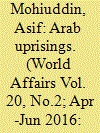

|
|
|
|
|
| Contents |
This article points out that the watershed events that initiated the period of contentious politics in the Arab world after 2010 not only reshaped regional and global politics but also challenged state power and long held theories dominant in the region, particularly about the popular acquiescence to regime control. They opened new areas of inquiry as well. By their impact on regional and international politics, these events have drawn the attention of scholars across the world. Some argue that these changes occurred as a result of the globalisation of democratic norms, new media technologies and regional structural changes, which led to widespread demonstrations, both violent and nonviolent. In calling for the downfall of the entrenched regimes, they signalled a breakdown of the social contract that had existed between the people and their rulers since independence.
|
|
|
|
|
|
|
|
|
|
|
|
|
|
|
|
| 2 |
ID:
146713
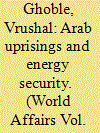

|
|
|
|
|
| Contents |
Popular protests in West Asia having rejected traditional political settings, aimed at carving out more just and inclusive dispensations. However, as the long term outcomes of these movements are still unknown, the sustenance of democratic ideals and the growth and prevalence of peace in the region are brought into question. There is also concern about energy supply disruptions affecting the global economy. This paper analyses the significance of Gulf oil from the geopolitical perspective and global energy security, given the diversity of producers today. Sanctions against Iran, the civil war in Syria, the sabotage of energy infrastructure in the region, all have global implications. This paper also highlights the volatility of the region, with civilian crises and external actors playing critical roles.
|
|
|
|
|
|
|
|
|
|
|
|
|
|
|
|
| 3 |
ID:
146714
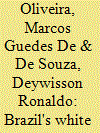

|
|
|
|
|
| Contents |
After Honduras, Paraguay, Peru and Argentina, Brazil now has a new conservative government intent on correcting the left leaning course of the previous administration led by the Workers’ Party. This paper explains the reasons for the disenchantment of the electorate with the policies of President Dilma Rousseff in a climate of economic crisis and widespread corruption. It argues that, taking advantage of the government’s weakness, the old business elites and landowning oligarchy have retaken power in a white coup in order to restore the status quo ante and preserve their long held dominance by using the pretext of corruption of which however they are the main practitioners and beneficiaries.
|
|
|
|
|
|
|
|
|
|
|
|
|
|
|
|
| 4 |
ID:
146715


|
|
|
|
|
| Contents |
This paper dissects the current global economic crisis and its causes and consequences in the Americas and Europe. It notes that from the beginning of the present century onwards, the left wing governments that were elected in much of South America improved the lot of the poorest sections of society but did not curb the power of the entrenched business elites and landowning oligarchies in a context of economic decline and malaise. The dysfunctional democratic system of Brazil and the influence of the reactionary upper classes served by the media and supported by neoconservative Pentecostal evangelist churches, led to the overthrow of President Dilma Rousseff in a soft coup aiming to restore fiscal austerity and liberal economic policies.
|
|
|
|
|
|
|
|
|
|
|
|
|
|
|
|
| 5 |
ID:
146709
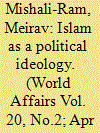

|
|
|
|
|
| Contents |
This article explores the sources of civil strife in Pakistan. It addresses the ongoing theoretical debate on the sources of violent strife, which distinguishes between material and perceptual causes of conflict and places sub-national identities within the context of political and socioeconomic circumstances. The article uses the BFRS Dataset of Political Violence in Pakistan to examine a wide array of deadly incidents from 1988 to 2011. It argues that among the various causes of the continuing conflict, the most prevailing source lies in the role assigned to Islam in Pakistan’s political ideology. In searching for an inclusive nationalism to unite micro identities loosely knitted together within the nation, Pakistan’s elites have drawn on Islam, which had been utilised as the founding logic of the state. In doing so, they have persistently promoted a message of Islamism that has now become the major source of internal strife.
|
|
|
|
|
|
|
|
|
|
|
|
|
|
|
|
| 6 |
ID:
146711
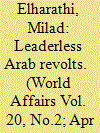

|
|
|
|
|
| Contents |
Examining scholarly literature on the recent and ongoing changes in the Arab world, this article makes a comparative analysis of the conceptual definitions of social, political and non-political revolutions to draw certain themes and explains regional events in the light of various ideological and sociological theories. It concludes that most Arab states are trapped in the conundrum of authoritarian rule or chaos and remain hostages of the secular military or Islamist “deep state” oligarchies.
|
|
|
|
|
|
|
|
|
|
|
|
|
|
|
|
| 7 |
ID:
146705
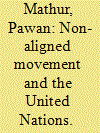

|
|
|
|
|
| Contents |
The demand for the reform of the United Nations Security Council (UNSC) is a longstanding one from the countries of the Global South. As the largest collective organisation representing these states, the Non-Aligned Movement has been the most vocal in demanding an improvement in the working of the UNSC. This article examines how the movement has reiterated its belief in making accountability, consistency and transparency the key elements of UNSC reform along with the demand for increasing regional representation in the council to overcome the existing democratic deficit.
|
|
|
|
|
|
|
|
|
|
|
|
|
|
|
|
| 8 |
ID:
146706


|
|
|
|
|
| Contents |
This article analyses the evolution of the international community since the end of the colonial period in the second half of the twentieth century and reflects on the transformation of the United Nations peacekeeping role in the context of rapid technological advances in the arms industry and rampant proliferation of the trade in ever more powerful weapons. It calls for a modernised, more responsive and competent United Nations to forestall crises and tackle challenges to peace and security.
|
|
|
|
|
|
|
|
|
|
|
|
|
|
|
|
| 9 |
ID:
146707
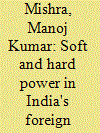

|
|
|
|
|
| Contents |
India adopted soft power as an instrumental tool in its foreign policy approach long before the term was formally conceptualised and became an integral concept in the discipline of international politics in the late 1980s, when Joseph Nye first introduced it to explain the changing dynamics of American foreign policy. The persistence and success of the Non-Aligned Movement in providing an alternative to the power politics of the Cold War era, laid the foundation of India’s soft power. However, New Delhi’s policy towards its South Asian neighbours throughout the Cold War period was marked by a hard power approach driven by security considerations. Although Indian leaders have attempted to build trust and enhance cultural, economic and political interactions with neighbours, especially since the enunciation of the Gujral Doctrine, efforts at accumulating more hard power resources by following a course of multi-alignment at the global level have undercut its soft power resources in the region.
|
|
|
|
|
|
|
|
|
|
|
|
|
|
|
|
| 10 |
ID:
146708
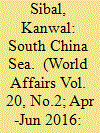

|
|
|
|
|
| Contents |
Faced with the rapid rise of the global power of China and its claims in the South China Sea, India has been bolstering cooperation with Vietnam, Japan and Australia to protect maritime security and freedom of navigation according to international laws of the seas in the Indo-Pacific region. India and the US have also strengthened relations in the interest of regional security. While New Delhi does not wish to isolate or ignore Beijing but rather include it in evolving international agreements, growing Chinese military influence in the Indian Ocean and Bay of Bengal remains one of India’s main concerns.
|
|
|
|
|
|
|
|
|
|
|
|
|
|
|
|
| 11 |
ID:
146712
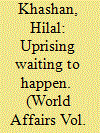

|
|
|
|
|
| Contents |
This paper contends that the Syrian Ba’ath Party’s authoritarian bargain introduced by the late Hafez al-Assad soon after he assumed the presidency in 1971, expired a few years prior to the eruptions of 2011. It demonstrates this termination by examining Syria’s political and social situation as well as the inability of the government to maintain a balance between regime security and the provision of welfare to the public. Despite a decline of welfare benefits, there was no reduction in the application of extreme coercion. Matters worsened with the alliance between the regime and the new urban business class that alienated the countryside, which previously had provided the bulwark against the threat of urban forces of change.
|
|
|
|
|
|
|
|
|
|
|
|
|
|
|
|